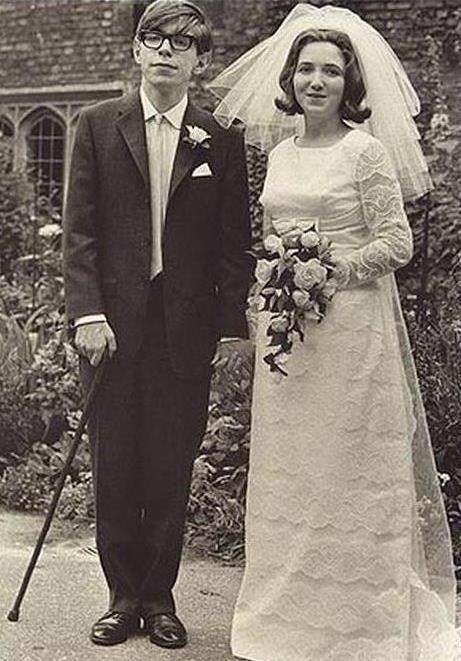 Stephen Hawking marrying his wife, Jane Wilde, during his early stages of ALShttps://www.telegraph.co.uk/news/science/stephen-hawking/11723153/Jane-Hawking-Stephen-is-not-giving-a-blanket-approval-for-assisted-dying.html
Stephen Hawking marrying his wife, Jane Wilde, during his early stages of ALShttps://www.telegraph.co.uk/news/science/stephen-hawking/11723153/Jane-Hawking-Stephen-is-not-giving-a-blanket-approval-for-assisted-dying.html
“The thing about a hero, is even when it doesn't look like there's a light at the end of the tunnel, he's going to keep digging, he's going to keep trying to do right and make up for what's gone before, just because that's who he is” (Joss Whedon). Whenever a hero is stuck or has lost all but one small glimmer of light, the hero will persevere. Whedon uses the metaphor to illustrate how, despite encountering obstacles, a hero will keep struggling to reach the light at the end of their tunnel with both undying resilience and determination. To be a hero in the eyes of society is not only to do extraordinary things but to achieve feats that are inspiring and admirable. When a hero achieves something with a limitation holding them back or against multiple obstacles, people view him/her as inspiring, as they become someone people hope to become. While heroes come in all shapes and sizes, they all have one thing in common: devotion. A hero will always put others before him/herself and do what they do for the betterment of others, passions, and even science. Heroes are beings who persevere through paramount hardship and push through their limitations to achieve the amazing, no matter how far or distant it may seem.
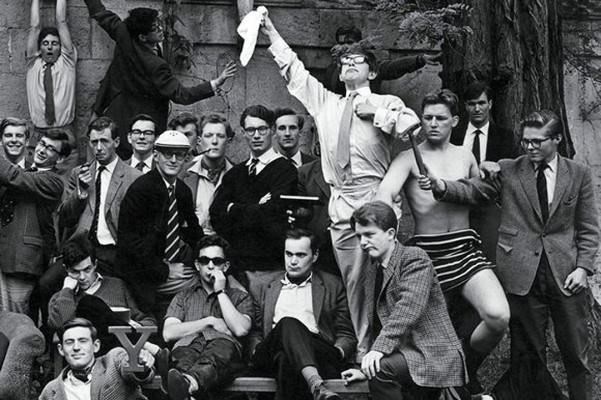 Stephen Hawking and the rest of the rowing club at Oxford University(Man holding handkerchief)https://www.universetoday.com/123487/who-is-stephen-hawking/One example of a hero is a man whose life was repeatedly devastated throughout his career. Stephen William Hawking lived in a moderately successful family, being the oldest of three siblings, and gained a strong, unusual passion for science at an early age. Like Einstein’s, Hawking’s early life was filled with laziness and was a focus for disappointment. But after he was accepted into an elite college, Hawking achieved monumental discoveries and made great findings, pushed by his passion for science. But his joy ended the day he walked into the hospital, two weeks after his 21st birthday. It was then that he discovered he had contracted Lou Gehrig’s Disease (ALS), a disease that usually plagues people over the age of 50 and reduces their remaining lifespan to two to five-years. Finding out about such a diagnosis would have shocked anyone. The average person would have given up and fallen into depression, but Hawking isn’t average. To make matters worse, everyone expected him to fail, for they knew ALS was inescapable, debilitating, and overall, a monstrous obstacle. But repeatedly, Hawking continues to defy expectations and rebounds even stronger than before, receiving countless accolades and continually changing the face of science. Because of his immense perseverance towards a formidable obstacle and his constant devotion to science in spite of it, Hawking embodies both courage and dedication. Stephen Hawking allows mankind to take giant leaps in science, making him not only one of the most inspiring beings on our planet but also someone who both persists through a horrific disease with enormous courage and revolutionizes the world of science with an everlasting dedication.
Stephen Hawking and the rest of the rowing club at Oxford University(Man holding handkerchief)https://www.universetoday.com/123487/who-is-stephen-hawking/One example of a hero is a man whose life was repeatedly devastated throughout his career. Stephen William Hawking lived in a moderately successful family, being the oldest of three siblings, and gained a strong, unusual passion for science at an early age. Like Einstein’s, Hawking’s early life was filled with laziness and was a focus for disappointment. But after he was accepted into an elite college, Hawking achieved monumental discoveries and made great findings, pushed by his passion for science. But his joy ended the day he walked into the hospital, two weeks after his 21st birthday. It was then that he discovered he had contracted Lou Gehrig’s Disease (ALS), a disease that usually plagues people over the age of 50 and reduces their remaining lifespan to two to five-years. Finding out about such a diagnosis would have shocked anyone. The average person would have given up and fallen into depression, but Hawking isn’t average. To make matters worse, everyone expected him to fail, for they knew ALS was inescapable, debilitating, and overall, a monstrous obstacle. But repeatedly, Hawking continues to defy expectations and rebounds even stronger than before, receiving countless accolades and continually changing the face of science. Because of his immense perseverance towards a formidable obstacle and his constant devotion to science in spite of it, Hawking embodies both courage and dedication. Stephen Hawking allows mankind to take giant leaps in science, making him not only one of the most inspiring beings on our planet but also someone who both persists through a horrific disease with enormous courage and revolutionizes the world of science with an everlasting dedication.
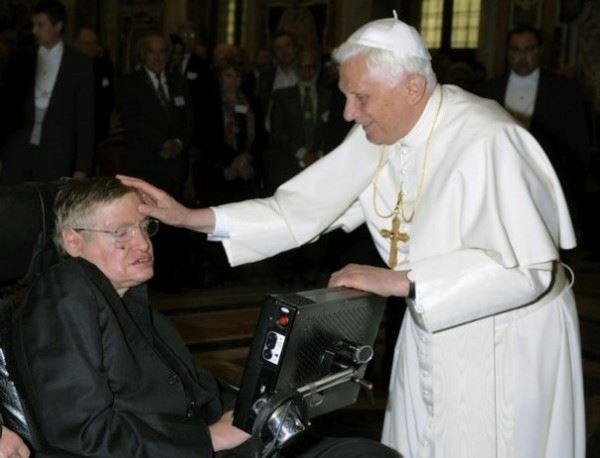 Stephen Hawking and Pope Francis meet at the Vaticanhttps://news.softpedia.com/news/Pope-Benedict-Meets-Stephen-Hawking-97025.shtml
Stephen Hawking and Pope Francis meet at the Vaticanhttps://news.softpedia.com/news/Pope-Benedict-Meets-Stephen-Hawking-97025.shtml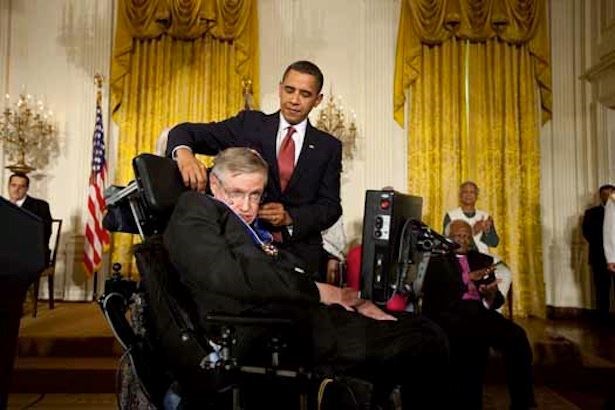 Hawking receiving the Presidential Medal of Freedom from Barack Obamahttps://www.standard.co.uk/news/stephen-hawking-receives-us-honour-6754217.htmlHawking suffers from a deadly illness, yet he managed to achieve what other scientists only could dream of, displaying great amounts of courage. After his 21st birthday, Hawking was diagnosed with an astoundingly rare disease yet still managed to achieve as much as he did: “Stephen Hawking has made huge discoveries. More importantly he has inspired many people to work for their dreams, yet still suffers from a disease that kills 85% of all who are infected with it… and that confines him to a wheelchair and requires him to use a computer and voice synthesizer to speak” (Joe Fredericksburg). Hawking goes on to achieve bigger and better things that anyone else wouldn’t have thought possible, added with the weight of being unable to speak, unable to walk, and with an illness that kills “85% of all who are infected with it.” His wheelchair and synthetic voice rule over him and “confine him,” which makes Hawking’s chair his own jail. Yet even with the chains that bind him and his powerful restrains Hawking still remains free. He goes on to achieve bigger and better things that anyone else wouldn’t have thought possible, added with the weight of being unable to speak, unable to walk, and with an illness that kills “85% of all who are infected with it.” Hawking is astoundingly courageous because of how big an obstacle he has to overcome, and how hard and painful it has to be to push it aside, yet he even goes on to come across “huge discoveries.” Before he achieved so much, Hawking recalls his time after his acceptance into the University of Cambridge, and his traumatic experience of ALS: “How could something like this happen to me? However, while I was at the hospital. I had seen a boy I vaguely knew die of leukemia in the bed opposite me, and it had not been a pretty sight. Clearly, there were people who were worse off than me--at least my condition didn’t make me feel sick. Whenever I feel inclined to be sorry for myself, I remember that boy” (Hawking 47). Hawking talks about how devastating the news of contracting ALS was for him, and demonstrates his pain by asking the most human of questions: Why me? However, instead of remaining regretful and depressed, Hawking looks to his side and sees a child suffering even more than him. He only exercises pity towards those in an even more wretched state than he is. By this, Hawking manages to find courage in a horrible nightmare and uses a boy as a lifelong reminder to never feel sorry for himself. Ultimately, Hawking demonstrates an extraordinary level of courage by displaying his bravery against a horrific enemy and doesn't feel sorry for himself even then, remaining brave and courageous.
Hawking receiving the Presidential Medal of Freedom from Barack Obamahttps://www.standard.co.uk/news/stephen-hawking-receives-us-honour-6754217.htmlHawking suffers from a deadly illness, yet he managed to achieve what other scientists only could dream of, displaying great amounts of courage. After his 21st birthday, Hawking was diagnosed with an astoundingly rare disease yet still managed to achieve as much as he did: “Stephen Hawking has made huge discoveries. More importantly he has inspired many people to work for their dreams, yet still suffers from a disease that kills 85% of all who are infected with it… and that confines him to a wheelchair and requires him to use a computer and voice synthesizer to speak” (Joe Fredericksburg). Hawking goes on to achieve bigger and better things that anyone else wouldn’t have thought possible, added with the weight of being unable to speak, unable to walk, and with an illness that kills “85% of all who are infected with it.” His wheelchair and synthetic voice rule over him and “confine him,” which makes Hawking’s chair his own jail. Yet even with the chains that bind him and his powerful restrains Hawking still remains free. He goes on to achieve bigger and better things that anyone else wouldn’t have thought possible, added with the weight of being unable to speak, unable to walk, and with an illness that kills “85% of all who are infected with it.” Hawking is astoundingly courageous because of how big an obstacle he has to overcome, and how hard and painful it has to be to push it aside, yet he even goes on to come across “huge discoveries.” Before he achieved so much, Hawking recalls his time after his acceptance into the University of Cambridge, and his traumatic experience of ALS: “How could something like this happen to me? However, while I was at the hospital. I had seen a boy I vaguely knew die of leukemia in the bed opposite me, and it had not been a pretty sight. Clearly, there were people who were worse off than me--at least my condition didn’t make me feel sick. Whenever I feel inclined to be sorry for myself, I remember that boy” (Hawking 47). Hawking talks about how devastating the news of contracting ALS was for him, and demonstrates his pain by asking the most human of questions: Why me? However, instead of remaining regretful and depressed, Hawking looks to his side and sees a child suffering even more than him. He only exercises pity towards those in an even more wretched state than he is. By this, Hawking manages to find courage in a horrible nightmare and uses a boy as a lifelong reminder to never feel sorry for himself. Ultimately, Hawking demonstrates an extraordinary level of courage by displaying his bravery against a horrific enemy and doesn't feel sorry for himself even then, remaining brave and courageous.
Watch the trailer for The Theory of Everything, based on Stephen Hawking's life.
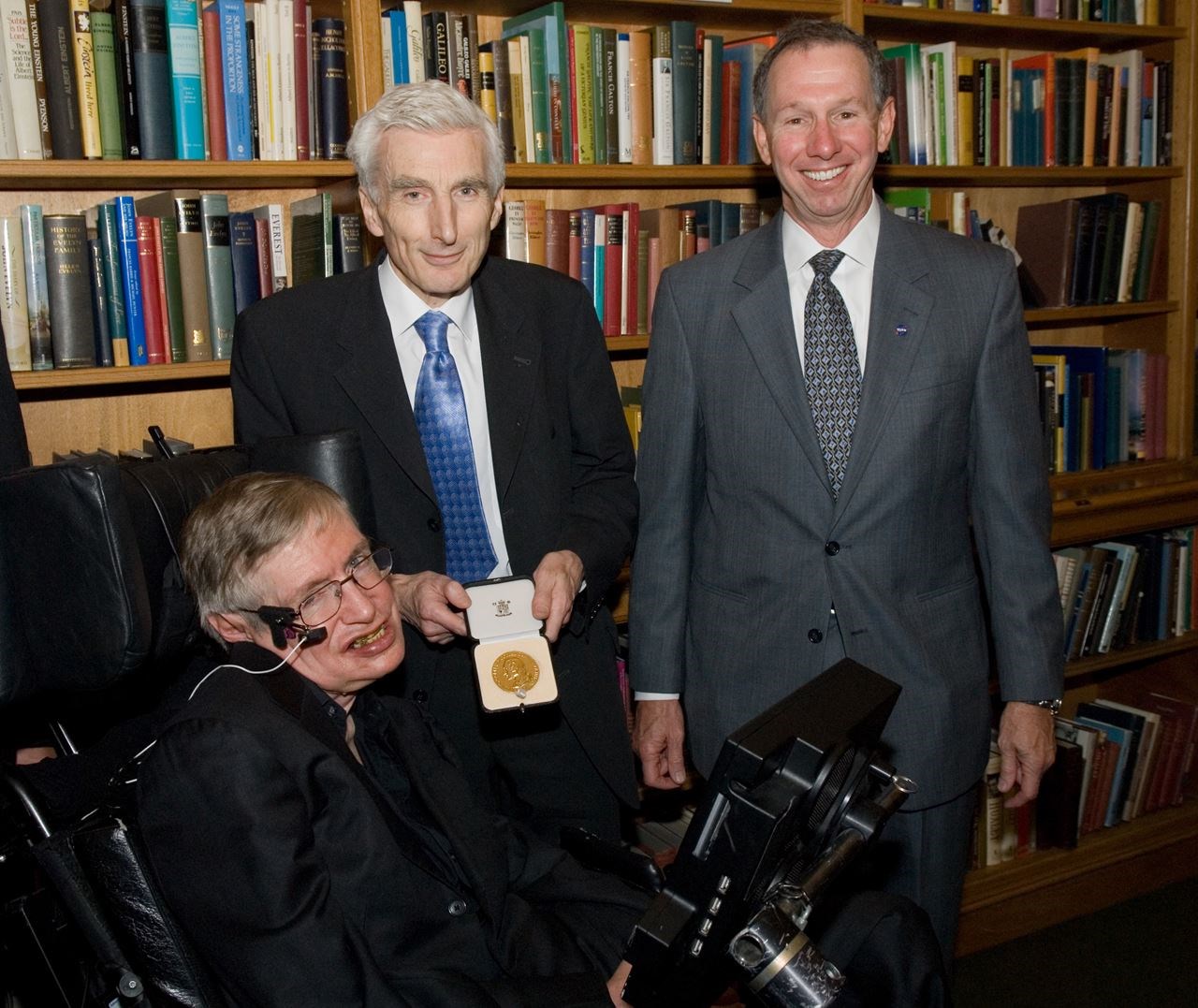 Hawking receiving the most prestigious honor possible from the Royal Society, the Copley Medalhttps://www.nasa.gov/multimedia/imagegallery/image_feature_710.html
Hawking receiving the most prestigious honor possible from the Royal Society, the Copley Medalhttps://www.nasa.gov/multimedia/imagegallery/image_feature_710.html
Hawking’s amazing accomplishments that he achieves while simultaneously enduring a powerful disease certifies Hawking’s undying, perpetual dedication to the vast and extraordinary world of science. Even in his dreadful condition, Hawking manages to achieve astounding awards and discoveries and proves his dedication by his constant persistence to science: “Early in 1974, at the unusually young age of 32, Hawking was named a fellow of the Royal Society… he continued to work toward a theory of the origin of the universe… In 1978, Hawking received the Albert Einstein Award of the Lewis and Rose Strauss Memorial Fund, the most prestigious award in theoretical physics.” Being accepted into the illustrious Royal Society, discovering possibilities for the universe’s origin, and winning the Einstein Award, all with a severe illness working against him, Stephen Hawking shows a true dedication to science. He also did all of this at “an unusually young age,” which displays how passionate and devoted he is to be able to achieve such remarkable accomplishments whilst being severely ill and disabled. After his 70th anniversary, many reporters approached Hawking to ask his view on how he persevered ALS: “Extremely few people have lived this long from Hawking’s aggressive ALS disease. Hawking simply says, when asked how he is still alive, 'My work is not done.’” (Joe Fredericksburg). Persevering through ALS for more than 50 years, losing his voice, control of his body, and personal life along the way, Hawking devotes his amazing, inspiring journey to science. By saying his “work is not done,” Hawking exemplifies how he has remained alive to explore the universe’s secrets, crediting his survival to his still-needed passions for science. It also shows how Hawking is constantly at the doors of death, and how even though he could die at any moment, he devotes his being alive to science so that he can fulfill his goals and dreams. Hawking always lived thinking he would die the next day and achieved numerous and prestigious accomplishments, allowing him to live his life to the fullest, fueled by his limitless passion and dedication to science.
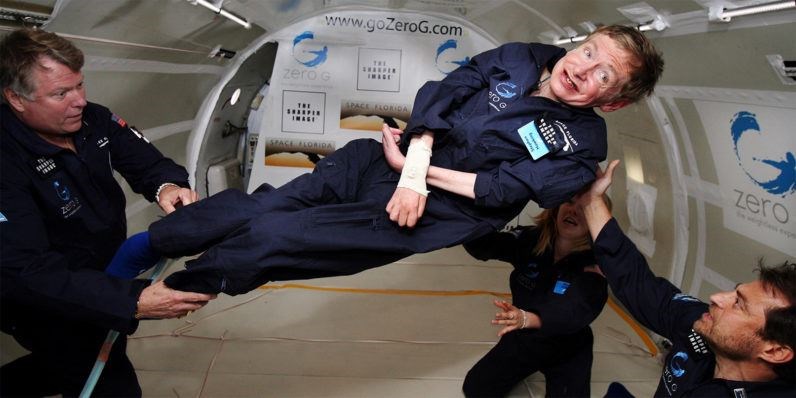 Stephen Hawking experiencing Zero-Gravityhttps://www.smithsonianmag.com/science-nature/picture-of-the-week-stephen-hawking-in-zero-gravity-87070032/As a result of his immense perseverance towards a formidable obstacle and his constant devotion to science in spite of it, Hawking displays both blinding courage and boundless dedication. Hawking overpowered ALS, a rare disease, with incalculable amounts of determination and perseverance. After being accepted into England’s most prestigious college, The University of Cambridge, and receiving his PhD while in a wheelchair, Hawking defies all expectations and inspires people today that anything is possible. Whether it be braving an illness, meeting the leaders of over 10 countries, or discovering theories that change the face of science, Hawking proves his heroic stature. Hawking is asked a question, “‘What is a typical day like for you?’ He replies: ‘Obviously, because of my disability, I need assistance. But I have always tried to overcome the limitations of my condition and lead as full a life as possible. I have traveled the world, from the Antarctic to zero gravity. Perhaps one day I will go into space.’” Hawking displays how, with his illness, he accomplishes so much, and how he “always tried to overcome the limitations” of his condition. By this, he is inspirational because of how much he did with a terrible illness pulling him down, and how much he still wants to do. Other people, disabled or not, find this inspirational because of how he deals with his hardship: overcoming it and living a life of astounding accomplishments and profound adventures. Finally, I find him inspirational because of how he suffers and loses so much, and while he experiences many chances to be depressed he never feels sorry for himself. His life is truly amazing and he embodies a perfect hero. My passions for science and my respect for him makes Hawking stand out even more to me, and every single hardship Hawking overcomes adds to his heroicness. Hawking’s perseverance through ALS is inspirational, amazing, and courageous. Even with the horrors of his disease, he went on to achieve countless accomplishments, goals, and dreams. An astounding thing Hawking says in an interview is "I would like to be thought of as a scientist who just happens to be disabled, rather than as a disabled scientist” (Hawking). As a grand finisher to his extraordinary and heroic life, Hawking surpasses his limitations and his powerful illness by not letting it control his life. Therefore, just like how any obstacle can be overcome, Hawking overpowers his limitations by being “a scientist who just happens to be disabled.”
Stephen Hawking experiencing Zero-Gravityhttps://www.smithsonianmag.com/science-nature/picture-of-the-week-stephen-hawking-in-zero-gravity-87070032/As a result of his immense perseverance towards a formidable obstacle and his constant devotion to science in spite of it, Hawking displays both blinding courage and boundless dedication. Hawking overpowered ALS, a rare disease, with incalculable amounts of determination and perseverance. After being accepted into England’s most prestigious college, The University of Cambridge, and receiving his PhD while in a wheelchair, Hawking defies all expectations and inspires people today that anything is possible. Whether it be braving an illness, meeting the leaders of over 10 countries, or discovering theories that change the face of science, Hawking proves his heroic stature. Hawking is asked a question, “‘What is a typical day like for you?’ He replies: ‘Obviously, because of my disability, I need assistance. But I have always tried to overcome the limitations of my condition and lead as full a life as possible. I have traveled the world, from the Antarctic to zero gravity. Perhaps one day I will go into space.’” Hawking displays how, with his illness, he accomplishes so much, and how he “always tried to overcome the limitations” of his condition. By this, he is inspirational because of how much he did with a terrible illness pulling him down, and how much he still wants to do. Other people, disabled or not, find this inspirational because of how he deals with his hardship: overcoming it and living a life of astounding accomplishments and profound adventures. Finally, I find him inspirational because of how he suffers and loses so much, and while he experiences many chances to be depressed he never feels sorry for himself. His life is truly amazing and he embodies a perfect hero. My passions for science and my respect for him makes Hawking stand out even more to me, and every single hardship Hawking overcomes adds to his heroicness. Hawking’s perseverance through ALS is inspirational, amazing, and courageous. Even with the horrors of his disease, he went on to achieve countless accomplishments, goals, and dreams. An astounding thing Hawking says in an interview is "I would like to be thought of as a scientist who just happens to be disabled, rather than as a disabled scientist” (Hawking). As a grand finisher to his extraordinary and heroic life, Hawking surpasses his limitations and his powerful illness by not letting it control his life. Therefore, just like how any obstacle can be overcome, Hawking overpowers his limitations by being “a scientist who just happens to be disabled.”
Works Cited
Fredericksburg, Joe. “Stephen Hawking.” The MY HERO Project, 4 May 2006,
myhero.com/Hawking_fredericksburg_06_ul.
Hawking, Stephen. My Brief History. Transworld, 2013.
"Stephen Hawking." Discovering Biography, Gale, 2003. Student Resources in Context,
Accessed 21 Dec. 2017.
"Stephen W. Hawking." Stephen W. Hawking Biography Today, Jan. 2010, p. 1. EBSCOhost
“Stephen W. Hawking.” The MY HERO Project, 8 Jan. 2018,
www.myhero.com/S_Hawking_dnhs_US_2011.
“Hawking, Stephen (1942- ).” World of Earth Science, Encyclopedia.com, 23 Feb. 2018, www.encyclopedia.com/people/science-and-technology/physics-biographies/stephen-hawking.
Page created on 2/23/2018 11:05:27 PM
Last edited 3/15/2018 4:35:54 PM
